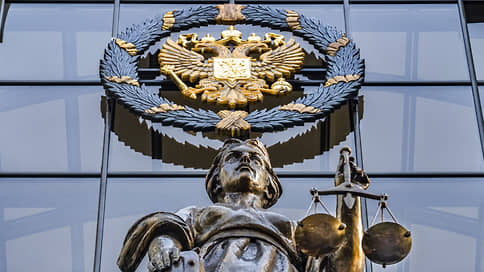The Supreme Court for the first time allowed to classify disputes on subsidiary liability at the request of the Federal Tax Service
[ad_1]

The Supreme Court of the Russian Federation (SC) for the first time allowed consideration of disputes on subsidiary liability in a closed court session at the request of the tax authorities. As a general rule, information about a tax offense is not a secret, but the Federal Tax Service insisted that it could not reveal all the evidence in an open process. Typically, such cases are not classified, but, lawyers say, now both tax authorities and businesses will ask about this more often.
The Supreme Court considered the dispute on the possibility of closing the trial (unauthorized persons are not allowed to the meetings, decisions are not published) due to tax secrecy. As part of the bankruptcy of Construction Company Afina LLC, the Federal Tax Service demanded that two citizens and two organizations be brought to subsidiary liability and recover 50.93 million rubles from them, including 43.65 million rubles. in your favor. According to the tax authorities, under director Yuras Alborov, the company withdrew assets and transferred the business to another legal entity, and the rest of the defendants became beneficiaries of the transactions. Arbitration courts of three instances held only the ex-director liable.
The Federal Tax Service appealed these decisions to the Supreme Court, insisting that in order to properly resolve the dispute, it needed to transfer more than 60 documents to the case file, access to which is limited by the norms of the Civil and Tax Codes, laws on banks, acts of civil status and personal data. To do this, the service filed petitions in the first instance to consider the dispute in a closed session and to demand evidence from itself, since the documents constitute a tax secret. But the courts rejected the requests, seeing no reason to classify the process. The case was referred to the Economic Collegium of the Armed Forces, which supported the tax authorities.
The Supreme Court clarified that the information available to the tax authorities “is confidential and can only be used within the limits specified by law.” The Federal Tax Service is “obliged to observe tax secrecy”, which consists of “any information received by the tax authority about the taxpayer, with the exception of public information”. When submitting certain documents to the service, the taxpayer must be sure that all information will be used only for the purpose of “determining the scope of the tax obligation”, they can be disclosed only with his consent, the board emphasized.
At the same time, it is “unlikely” that the defendants would agree to the disclosure of tax secrets, because for them it is “extremely unprofitable,” the Supreme Court noted. Meanwhile, tax control materials can be used to “prove the factual circumstances” in the case, and given that these documents “may constitute a tax secret,” the dispute “may be held in closed session,” admitted the Supreme Court. As a result, “the courts violated the fundamental procedural right of the authorized body to a fair trial,” the Supreme Court decided, sending the dispute for a new consideration.
This is the first time that the Supreme Court allowed the possibility of transferring the case on subsidiary liability to the mode of closed hearings due to the fact that it is necessary to demand the materials of tax audits, says Case by Case lawyer Yulia Mikhalchuk. Aleksey Sharov, managing partner of AVERTA Group, believes that the main reason for the position of the Supreme Court was the refusal of the courts to demand tax audit materials that could confirm the validity of the claims against the defendants.
According to Yulia Mikhalchuk, in most of these disputes, the question of whether someone’s rights are violated by disclosing information from the tax office was not previously raised at all. Mr. Sharov admits that tax accounting materials are “quite often” used in cases of a subsidy “without any restrictions” and allow “to establish a real picture of the economic activities of the debtor and its affiliates.”
In addition, when considering a petition to close the process, the court usually checks whether it is possible “to ensure the safety of information in another way — to black out protected information without losing the general meaning of the document or to examine only one document,” notes Rimma Malinska, head of commercial disputes at MEF Legal. At the same time, she “doesn’t understand what prevented the tax authorities from submitting audit materials to the case,” because they brought analytical materials based on them to the first instance.
ProLegals partner Elena Kravtsova believes that closing the meeting at the request of the tax authorities only “contradicts the constitutional principle of the publicity of the trial,” which is “a guarantee of a fair trial.” She recalls the explanations of the Supreme Arbitration Court that, according to the general rule, “information about a tax violation and tax arrears is not a tax secret”, and when considering the issue of closing the session, the court must check whether “the information really belongs to a secret”.
In the future, Rimma Malinska expects “an increase in references to tax secrecy and attempts to close court hearings” from all participants in cases. “At least, the petitions of the tax authorities to close the process will be announced and granted more often,” adds Mr. Sharov. However, lawyers hope that “there will be no mass classification of subsidy cases.” Given that the Supreme Court left the opportunity for the defendants to object to the closure of the hearings, this should “compensate for the possibility of abuse,” Elena Kravtsova believes.
At the same time, Yulia Mikhalchuk fears that the position of the Supreme Court may lead to the fact that, instead of switching to a closed regime, the courts will “more strictly consider and more often refuse applications for demanding sensitive information” with reference to secrecy, which “will significantly complicate the work of lawyers.”
[ad_2]
Source link





